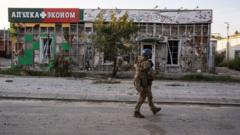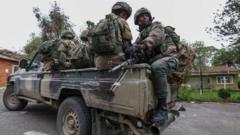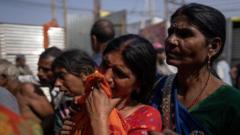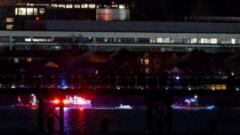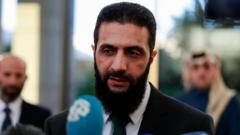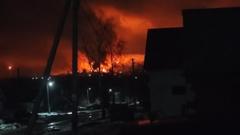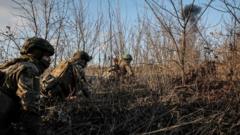Recent reports indicate that North Korean troops, sent to assist Russia in battling Ukraine, have been removed from the front lines following significant losses, posing various implications for the ongoing conflict.
North Korean Forces Withdraw from Ukraine Front Lines Amid Heavy Losses

North Korean Forces Withdraw from Ukraine Front Lines Amid Heavy Losses
North Korea's military support for Russia in Ukraine's war appears to falter as troops are pulled back due to casualties.
North Korean soldiers deployed to aid Russian forces against Ukraine have reportedly been withdrawn from front-line combat after suffering heavy casualties, according to Ukrainian and U.S. officials. They noted that these troops have not been visible on the battlefield for approximately two weeks. The initial arrival of around 11,000 North Korean soldiers in November caused alarm in Ukraine and among its Western allies, raising concerns about a potential escalation in the ongoing war.
However, after just three months, the numbers of North Korean soldiers have significantly decreased, with estimates suggesting a reduction of around 50%. General Oleksandr Syrsky, Ukraine's top military commander, indicated the heavy toll these troops face in combat. Reports from frontline units describe North Korean fighters as fierce but highlight their disorganization and inability to integrate effectively with Russian military forces, leading to higher casualty rates.
Ukrainian forces have noted that North Korean troops have been left to operate largely unaided, advancing with limited armored support and a lack of coordinated tactics. Critics of Ukraine's military strategy have pointed to the campaign in Russia's Kursk region as a misuse of resources amid sustained Russian offensives; however, Ukrainian President Volodymyr Zelensky remains firm in his strategy, aiming to hold this territory as leverage for potential peace negotiations in the future.
The complexities of the battlefield dynamics continue to unfold, as the war, now nearly three years old, presents ongoing challenges for both sides involved.
However, after just three months, the numbers of North Korean soldiers have significantly decreased, with estimates suggesting a reduction of around 50%. General Oleksandr Syrsky, Ukraine's top military commander, indicated the heavy toll these troops face in combat. Reports from frontline units describe North Korean fighters as fierce but highlight their disorganization and inability to integrate effectively with Russian military forces, leading to higher casualty rates.
Ukrainian forces have noted that North Korean troops have been left to operate largely unaided, advancing with limited armored support and a lack of coordinated tactics. Critics of Ukraine's military strategy have pointed to the campaign in Russia's Kursk region as a misuse of resources amid sustained Russian offensives; however, Ukrainian President Volodymyr Zelensky remains firm in his strategy, aiming to hold this territory as leverage for potential peace negotiations in the future.
The complexities of the battlefield dynamics continue to unfold, as the war, now nearly three years old, presents ongoing challenges for both sides involved.


